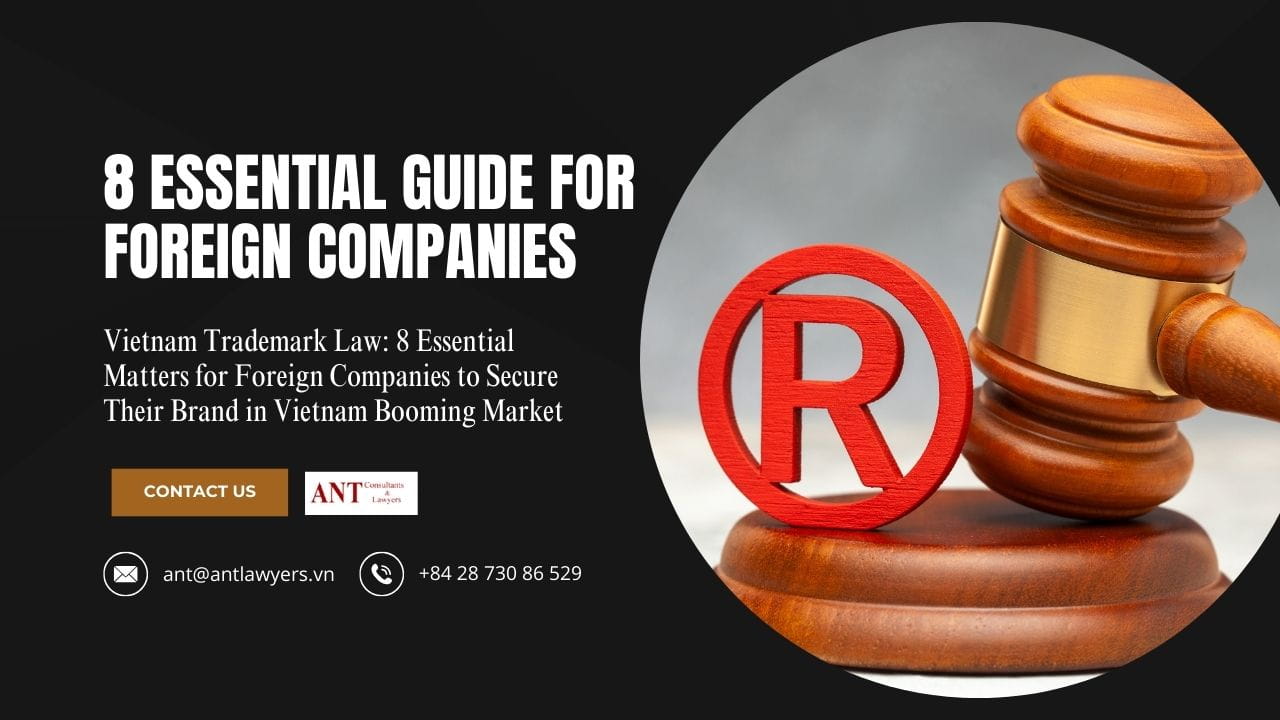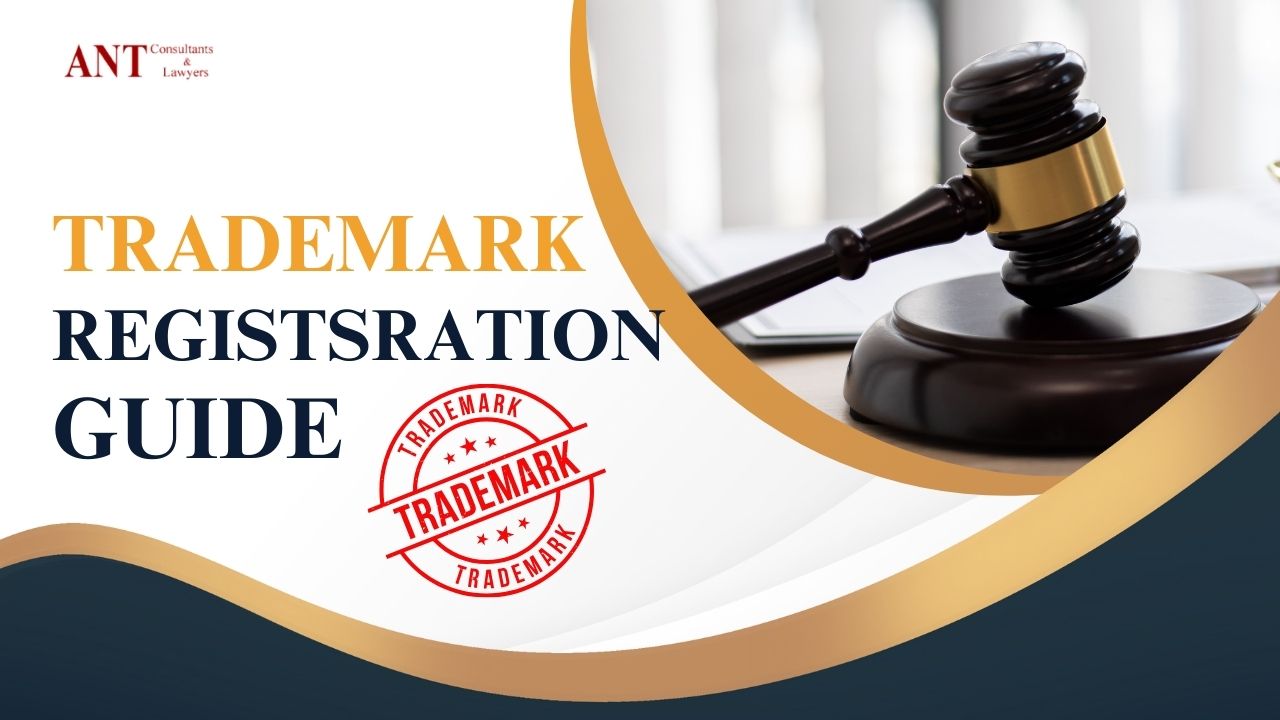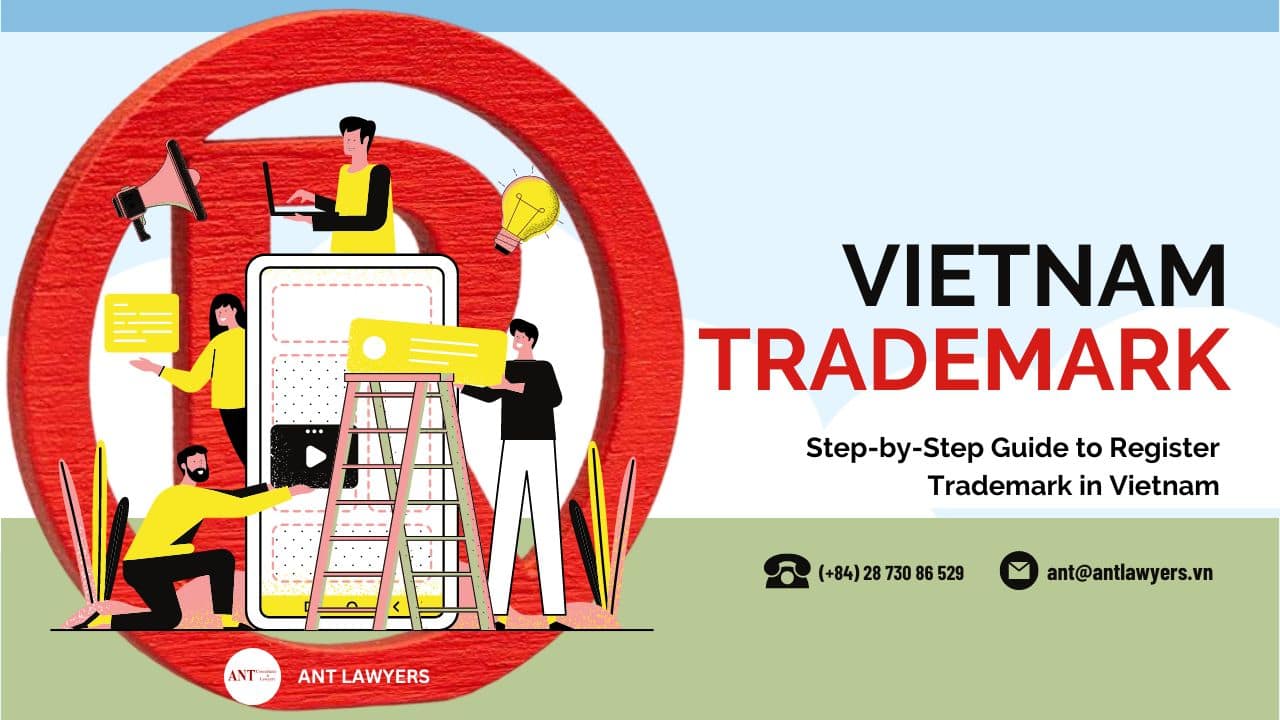Vietnam Trademark Law: 8 Essential Matters for Foreign Companies to Secure Their Brand in Vietnam Booming Market


Vietnam Trademark Law
Vietnam Trademark Law: Essential Guide for Foreign Companies to Secure Their Brand in a Booming Market
Vietnam’s rapid economic growth, strategic location, and strong trade agreements make it an attractive destination for foreign companies looking to invest, expand, or conduct business. Whether you are setting up a new venture, engaging in commercial transactions, or launching a brand in Vietnam, one of the most crucial steps is to protect your intellectual property assets—especially trademarks.
Vietnam trademark law plays a vital role in ensuring that your brand identity remains exclusive, preventing counterfeiting, and securing your market position. However, navigating Vietnam trademark law can be complex due to local legal nuances, bureaucratic processes, and enforcement challenges.
This guide provides a detailed breakdown of Vietnam trademark law, covering registration, enforcement, licensing, and potential legal risks for foreign companies operating in Vietnam.
Why Trademarks Matter for Foreign Companies in Vietnam
A trademark is a unique sign, word, symbol, or combination that distinguishes goods or services. Trademarks are critical for foreign businesses entering Vietnam because they:
• Establish brand identity and consumer trust.
• Prevent unauthorized use and counterfeiting.
• Provide legal protection in disputes.
• Increase business valuation and investment attractiveness.
Vietnam has a first-to-file trademark system, meaning whoever registers the trademark first gets the rights, regardless of prior use. This makes early registration essential for foreign companies expanding to Vietnam.
Understanding Vietnam Trademark Law: Key Principles
What is a Trademark in Vietnam?
Under Vietnam trademark law, a trademark can include:
-Words, phrases, slogans
-Logos, images, symbols
-Three-dimensional (3D) marks
-Sound marks (newly recognized under the 2022 IP Law amendments)
However, trademarks cannot be generic, deceptive, or similar to existing registered trademarks.
Who Can Register a Trademark?
-Foreign companies must file through a Vietnamese trademark agent or law firm.
-Local entities can file directly with the Intellectual Property Office of Vietnam (IP Vietnam).
-International businesses can register via the Madrid System (for global trademark protection).
Trademark Registration Process in Vietnam
Step 1: Filing the Trademark Application
Applications are submitted to IP Vietnam and must include:
-Applicant details.
-Trademark sample.
-List of goods/services under Nice Classification.
-Power of attorney (for foreign applicants).
Step 2: Formal Examination (1-2 months)
IP Vietnam checks for compliance with procedural requirements.
Step 3: Substantive Examination (6-12 months)
The office examines:
-Distinctiveness of the mark.
-Similarity to existing trademarks.
-Legal compliance.
Step 4: Publication for Opposition (2 months)
Once approved, the trademark is published for potential oppositions by third parties.
Step 5: Issuance of Trademark Certificate (10-year validity, renewable indefinitely)
If no objections arise, the trademark is registered for 10 years and can be renewed.
Trademark Protection & Enforcement in Vietnam
Vietnam has strict trademark protection laws, but enforcement can be challenging.
Trademark Infringement & Legal Remedies
- Common trademark violations include:
Counterfeiting and imitation of well-known brands.
-Unauthorized use of trademarks on goods/services.
-Domain name cybersquatting.
- Legal enforcement options:
-Administrative penalties: Fines, confiscation of infringing goods.
-Civil lawsuits: Injunctions, damages, court orders.
-Criminal penalties (for large-scale counterfeiting).
Trademark Opposition & Cancellation
-Opposition: Third parties can challenge a trademark within 2 months of publication.
-Cancellation: A registered trademark can be canceled if not used for 5 consecutive years.
Protecting Well-Known Trademarks in Vietnam
Vietnam recognizes well-known trademarks under IP Law, even without formal registration. However, proving well-known status requires:
-Market surveys and consumer recognition data.
-Extensive use in commerce.
-Advertising, sales, and financial records.
For foreign famous brands, legal battles against counterfeiters are frequent. Early trademark registration reduces legal risks and strengthens brand protection.
Trademark Licensing & Assignment in Vietnam
-Foreign companies can license trademarks to local distributors, franchisees, or subsidiaries.
-Licenses must be registered with IP Vietnam to be legally enforceable.
-Trademarks can be transferred (sold) to another entity.
-Assignments must be notarized and registered.
Challenges in Vietnam Trademark Law & Potential Improvements
Current Challenges:
-Lengthy registration process (18-24 months).
-Bad-faith trademark registrations (trademark squatting).
-Weak enforcement in online marketplaces.
-Inconsistent legal decisions across enforcement agencies.
-Difficulty proving well-known trademarks without a clear framework.
Suggested Improvements:
-Faster trademark processing through digital systems.
-Stronger penalties for trademark squatters.
-Better coordination between customs, courts, and IP Vietnam.
-Stricter rules for online trademark enforcement.
Recommendations for Foreign Companies Doing Business in Vietnam
To protect your intellectual property assets, follow these best practices:
Register Your Trademark Early
-Use Vietnam trademark law strategically to secure rights before entering the market.
Monitor & Enforce Your Trademark
-Regularly check for counterfeit products.
-Take legal action against infringers.
Work With a Local Trademark Attorney
-Foreign companies must file through local trademark agents.
-A Vietnamese IP lawyer can help with registration, opposition, and enforcement.
Conclusion
Vietnam trademark law is essential for foreign companies looking to protect their brand, engage in business transactions, and invest in Vietnam. While Vietnam provides strong legal protections, enforcement challenges remain. By registering trademarks early, enforcing rights proactively, and partnering with local legal experts, foreign businesses can safeguard their intellectual property in Vietnam.
If you plan to enter Vietnam’s booming market, make trademark protection a priority to secure long-term business success.
ANT Lawyers, Law Firm in Vietnam
We help clients overcome cultural barriers and achieve their strategic and financial outcomes, while ensuring the best interest rate protection, risk mitigation and regulatory compliance. ANT lawyers has lawyers in Ho Chi Minh city, Hanoi, and Danang, and will help customers in doing business in Vietnam.


11 Essential Answers You Need: The Trademark Registration in Vietnam Guide


How to Easily Register Trademark in Vietnam: A Comprehensive Guide
Trademark protection in Vietnam? How does it work?
Vietnam Trademark Registration. How to Proceed?
Register an International Trademark Registration in Vietnam Under Madrid Protocol
Trademark Infringement Lawyers in Vietnam: 7 Crucial Reasons to Act Fast on Self-Protection
Top 10 Reasons Why Vietnam Trademark Lawyers Are Essential for Protecting Your Business
How ANT Lawyers Could Help Your Business?
You could learn more about ANT Lawyers IP Practice or contact our Intellectual Property Lawyers in Vietnam for advice via email ant@antlawyers.vn or call our office at (+84) 24 730 86 529
Recent Posts
6 Smart Moves to Improve ESG for Exporters in Vietnam and Unlock Global Trade Advantages
The World Is Watching You have the product. The factory is certified. Your logistics are…
7 Essential Truths to Open an Indirect Investment Account in Vietnam and Grow with Confidence
Do you want to invest overseas into Vietnam? Do you want to open an indirect…
5 Crucial Facts About ESG Laws in Vietnam That Could Save Your Business and Reputation
The Business World Is Changing Fast Rules are shifting. Expectations are rising. Eyes are watching. …
7 Powerful Reasons Why ESG Compliance in Vietnam Will Win You Trust, Growth, and Global Clients
Trust matters. Today, more than ever. Across industries, many companies are now being asked. directly…
7 Bold Reasons Why Tokenization in Vietnam Could Transform Your Future
Change is coming. Quietly. Digitally. Rapidly. Let’s imagine the situation, which assets are no longer…
Vietnam P2P Lending: 5 Bold Reasons Why Decree 94/2025 Could Empower Millions or Backfire?
A New Financial Chapter Begins in Vietnam One person lends. Another borrows. It’s that simple.…


